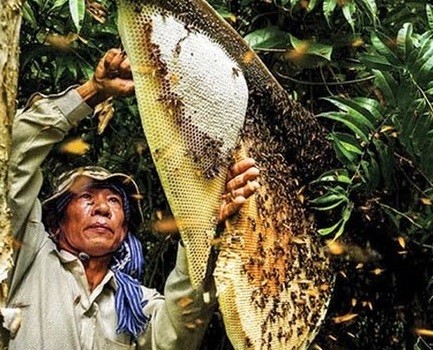(VOVworld) – Beekeeping for honey production has recently developed in the Mekong Delta Region, bringing in hundreds of millions of US dollars in export revenue every year. The honey-bee has been selected as a domestic animal good at adapting to the Mekong Delta environment.
Since its recognition as a collective brand, U Minh Ha Forest Honey as Ca Mau Province has become more available in domestic and foreign markets.
 |
| (Photo: vietnamnet.vn) |
There are thousands of households involved in beekeeping for honey production in U Minh Ha Cajuput Forest. Each household can manage up to one hundred beehives, giving them a relatively high income.
Tran Van Nhi of U Minh District told us his story: “I’ve been doing this job for 39 years. Beekeeping for honey is the main occupation of farmers in U Minh Ha Forest. It takes 15 to 20 days to get honey from each beehive. It’s possible to collect honey after 12 days but only if there is an urgent need.”
Vietnam’s exports of honey and wax are predicted to have positive prospects as global market demand rises and Vietnam is on the threshold of international integration. More particularly when the Trans-Pacific Partnership agreement comes into force, it will offer more export opportunities for Vietnamese honey.
Pham Van Dong, Director of the Veterinary Department under the Ministry of Agriculture and Rural Development, said: “Vietnam exported up to 50,000 tons of honey as in 2014 and last year it was about 40,000 tons. The product has mainly been sold to the EU and America.”
Bee products, including honey and wax, have high medicinal and economic values. Making full use of natural advantages in combination with traditional experience and modern technologies, many farming households have become well-off by keeping bees for honey and planting ornamental trees.
According to the Ministry of Agriculture and Rural Development, Vietnam has more than 1.5 million flocks of bees, 120,000 which are in the Mekong Delta Region, generating a yearly output of 240 tons of honey.
Following a recent drought in the region, the bee has been chosen as a domestic animal that can easily adapt to local the conditions.
Nguyen Van Tranh, Deputy Director of the provincial Department of Agriculture and Rural Development, said beekeeping has created jobs and increased local incomes.
“U Minh Forest Honey is a natural and pure product. This is an advantage in Ca Mau, which is faced which is faced with drought. Over the last year, there were about 100,000 beehives, each of them producing up to 6 liters of honey. At an average price of 13 USD a liter, this could be a big source of income for people who live in U Minh Ha Forest,” said Tranh.
Vietnam is in the top 10 leading exporters of honey in the world and ranks first in output among exporters of honey to the US market.